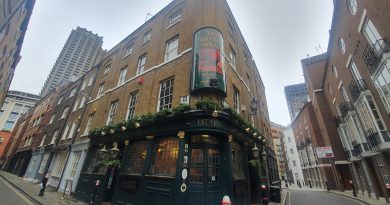London – City of London – St. Dunstan’s Court
Like the yards of Norwich, I rather expected the series of courts off Fleet Street to have some kind of long heritage.
But, at first this didn’t seem to be the case. The red cursor on the above map from 1920 shows where the court goes through the building today. Indeed, on late nineteenth century maps, it shows that this was the site of a pub rather than a court. The court takes its name from the nearby medieval church of St Dunstan in the West (this makes sense as there’s another one in the East, albeit mostly destroyed during the Second World War, which isn’t too far from the Tower of London).
However, the 1886 Insurance Plan of London shows that the court was there and this tallies up with 160 Fleet Street being the Hole in the Wall pub. The court doesn’t really go anywhere, it just reaches what was a playground in 1886 and then joins onto Bolt Court, which is as it is today (although the playground has gone). Also visible in this map is an electrotype facility, a useful and quite modern publishing device at the time. There’s a photo on Wikipedia of a set-up in 1902 that was used at the New York Herald, and I imagine that it was equally cramped.
Each of the courts off Fleet Street on the north side of the road has tablets which show the heritage of the newspaper industry, which is what this area was once known for. This one shows the 1980s computerised printing technology that was introduced, that brought about the demise of the traditional printed processes. The usage of the Space Invaders as an example of something from the 1980s is perhaps a little obscure, but it stands out on the pavement.
There was a court case heard at the Mansion House in September 1896 when a Mr Charles Pensotti was accused of stealing letters from a post box on St. Dunstan’s Court. He had been interfering with letters placed there by Dean & Son, a publisher of some note, who wondered why cheques and postal orders had been going missing. When arrested, Pensotti was found to have a number of blank cheque books and six picklock keys, but he said to the police that it was a big mistake.






